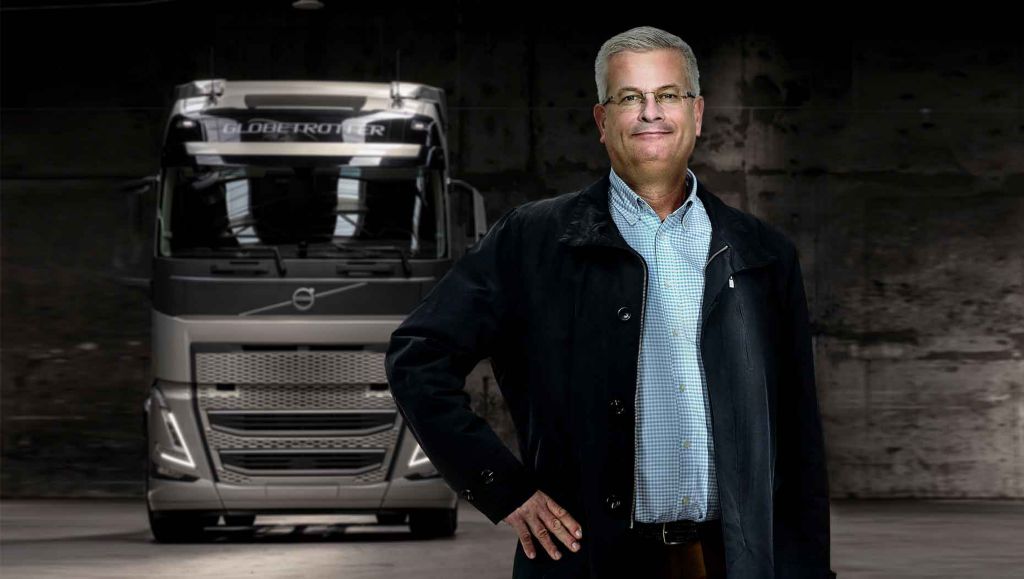“Our most fuel-efficient truck range ever”


What can customers expect in these new trucks in terms of fuel efficiency?
“They can expect our most fuel-efficient trucks to date. Fuel makes up about one third of hauliers’ costs, so we continue to do everything we can in order to find new ways of reducing fuel consumption in our trucks. As a result, the fuel use and CO2 emissions of a typical long-distance diesel Volvo truck have been reduced by more than 20 per cent since the 1990’s. The latest Euro 6 step D engines in the new range, for example, include a number of efficiency improvements including a VDS-5 low viscous oil type and new piston oil scraper rings that lower fuel consumption. While new technologies, including map-based I-See and the freewheel function I-Roll make use of the truck’s driving force to reduce fuel consumption even further.”
How can these trucks be specified to be extra fuel efficient?
“The new Volvo FH, FH16, FM and FMX trucks can be tailored to suit a wide range of applications to allow significant additional fuel and CO2 savings. For long-haul operations, the new Volvo FH with I-Save combines the D13TC engine with a package of features and can deliver fuel cost savings (diesel and AdBlue) of up to seven per cent.* At the same time, both the Volvo FH and FM are available in LNG versions. These cut fuel costs and CO2 emissions by up to 20 per cent. With BioLNG, those emissions are brought down to virtually zero.”
With all the advances in alternative fuels, why is Volvo Trucks launching a diesel range?
“Every type of fuel, from electricity to LNG, to biogas and diesel has its specific advantages as well as weak points and is suited to different types of transport tasks. Because of that, I think we’ll see different energy sources and drivelines side by side for many years to come. At the same time that we develop alternatives, Volvo Trucks is continuing to innovate to make our diesel trucks as efficient as possible. The newest Volvo FH with I-Save, for example, which uses a unique type of turbo-compound technology is definitive proof of how far we can still push the boundaries of fuel efficiency.”
How does it contribute to Volvo’s long-term zero emissions vision?
“We are in a transitional period where we are moving from decades of dependence on oil to more resource-efficient and renewable alternatives. The push towards energy-efficiency as well as developing alternative fuels are both important parts on the path towards zero emissions.”
FACTS
Volvo FH with I-Save
Combines the new D13TC engine with a package of features, delivering fuel cost savings of up to seven per cent.*
Gas-powered LNG engine
The gas-powered Volvo FH LNG and Volvo FM LNG run on either Liquefied Natural Gas (LNG)which reduces CO2 emissions by up to 20 per cent compared to diesel, or BioLNG, which reduces CO2 by up to 100 per cent. This relates to emissions from the vehicle during usage, known as tank-to-wheel.
Liquid natural gas (LNG)
LNG is made from natural gas, a fossil fuel. It is made liquid for transport or storage by cooling the gas to low temperatures.
BioLNG
BioLNG, also called Liquified Biogas (LBG), is a biofuel made by processing organic waste flows. The biogas develops when biological matter breaks down. The gas is then cooled to low temperatures.
*The fuel improvement claim is calculated by comparing costs of diesel and AdBlue for D13TC Euro 6 step D with the Long-Haul Fuel Package (I-Save) to D13 eSCR Euro 6 step D without the Long-Haul Fuel Package. Actual fuel economy may vary depending on many factors such as the driver’s experience, use of cruise control, vehicle specification, vehicle load, actual topography, vehicle maintenance and weather conditions.